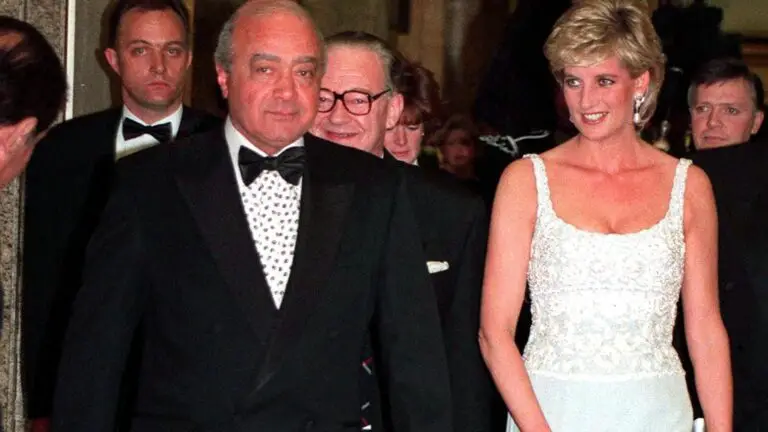MOHAMED AL-FAYED: The Flamboyant Businessman with an Imaginative Legacy
Imagine being buried on top of a famous department store. That’s what Mohamed Al-Fayed once dreamed of for Harrods. While that plan didn’t come true, his life took many fascinating twists. Instead of his final resting place, Harrods became a tribute to his son Dodi and Princess Diana, who tragically passed away in a car accident in 1997.
Mohamed Al-Fayed was an Egyptian-born tycoon who spent his life challenging the upper-class society he once aspired to be a part of. He held onto the belief that what he considered “murder” was responsible for the tragedy until his last days. This notion might have been a fantasy, but Al-Fayed’s entire life was marked by exaggeration and fantasy.
Born in Alexandria on January 27, 1929, Al-Fayed’s early years were anything but glamorous. He started out selling Coca-Cola on the streets and worked as a door-to-door sewing machine salesman. A pivotal moment came when he crossed paths with Adnan Khashoggi, an arms dealer, who recognized Al-Fayed’s talents in contract negotiations.
From there, Al-Fayed’s journey took off. He ventured into shipping, established useful contacts in Geneva and London, and even claimed connections to Egypt’s exiled royals, adopting the name Al-Fayed to solidify this non-existent link. By 1967, he was a millionaire with a thirst for both wealth and status.
The 1980s marked a turning point when Al-Fayed, along with his brothers, acquired Harrods and made considerable donations to charities, including Great Ormond Street Hospital. He set out to revitalize the store, famously stating that Harrods was a “heap of s**t” when he bought it.
Despite his ambition, Al-Fayed faced challenges in being accepted by the British elite. He even believed they hindered his quest for British citizenship. His life took a remarkable turn when he got involved with Princess Diana. They became close, with his son Dodi joining the picture. Tragedy struck in 1997, as both Dodi and Diana lost their lives in a car crash.
Al-Fayed believed a conspiracy lay behind their deaths and accused Prince Philip and the royal family of orchestrating it. His claims never gained official traction, but he stuck to his story until the end. In 2010, he sold Harrods, and his later years were marked by his strong conviction that his son’s demise was due to a royal plot.
The flamboyant life of Mohamed Al-Fayed teaches us that reality and imagination can intertwine in fascinating ways, shaping the legacy of a man who defied conventions and remained unapologetically unique.

